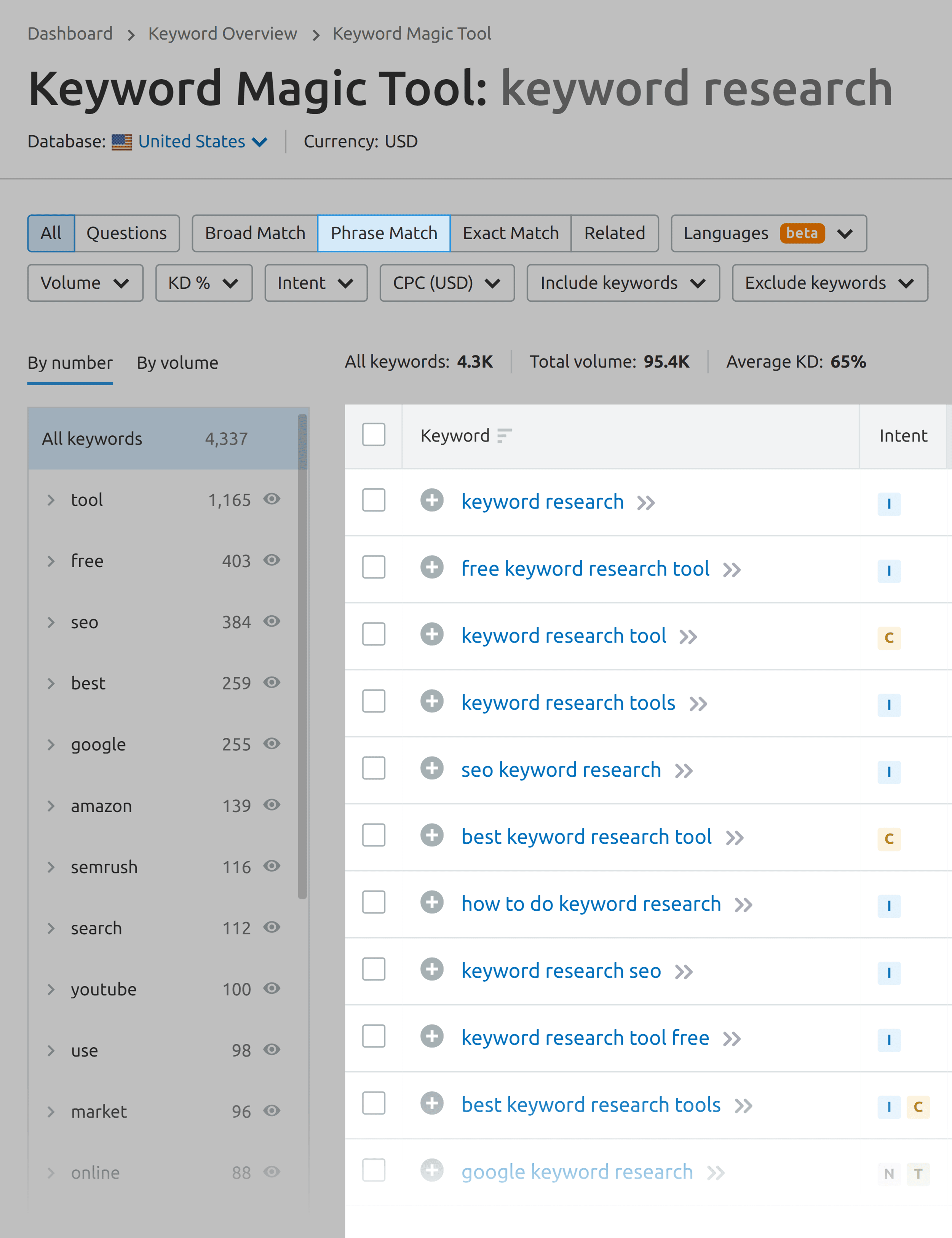The best SEO keyword research tool is Ahrefs. It offers comprehensive data and powerful features for effective keyword analysis.
Ahrefs is a top choice for SEO professionals due to its extensive database and user-friendly interface. It provides in-depth insights into keyword difficulty, search volume, and potential traffic, allowing marketers to optimize their strategies effectively. The tool also includes features for competitor analysis, backlink tracking, and content research, making it a versatile option for comprehensive SEO efforts.
Its intuitive design and actionable data help users identify high-performing keywords, monitor their rankings, and improve their search engine visibility. Ahrefs ensures that businesses stay ahead in the competitive landscape by offering reliable, up-to-date information.
Introduction To Seo Keyword Research
SEO keyword research is essential for any online presence. It helps to find the right words to attract visitors. This process involves identifying words and phrases people use in search engines. These words are known as keywords. Using the right keywords can boost your website’s visibility.
Importance Of Keywords
Keywords are the foundation of SEO. They help search engines understand your content. When users type keywords, search engines match them with relevant content. Using the right keywords can increase your chances of appearing in search results. This can drive more traffic to your site.
For example, if you have a blog about cooking, important keywords could include “easy recipes,” “healthy meals,” or “quick dinners.” These phrases are what users search for when looking for cooking ideas. By including these keywords in your content, you make it easier for search engines to find your blog.
Role In Seo Strategy
Keywords play a crucial role in your SEO strategy. They help you target the right audience. This means attracting visitors who are interested in your content. A well-planned keyword strategy can improve your search engine ranking. This leads to more visibility and potentially more customers.
Here are some key steps in developing an effective keyword strategy:
- Identify your target audience.
- Research relevant keywords.
- Analyze competitor keywords.
- Select high-traffic, low-competition keywords.
- Incorporate keywords naturally into your content.
Using tools for keyword research can simplify this process. These tools can provide insights into keyword performance. They can help you find the best keywords for your content.
| Keyword Research Tool | Features |
|---|---|
| Google Keyword Planner | Free, detailed search volume data |
| SEMrush | Comprehensive keyword analysis, competitor insights |
| Ahrefs | Keyword difficulty, search traffic estimates |
Choosing the right tool can make a big difference. It can streamline your keyword research process. This leads to better results and higher search engine rankings.

Credit: backlinko.com
Features Of Top Keyword Research Tools
Choosing the best SEO keyword research tool is crucial. The right tool can make your SEO strategy successful. Let’s explore the key features of top keyword research tools.
User-friendly Interface
User-friendly tools make your work easier. They save you time and effort.
- Intuitive Design: Easy navigation and clear options.
- Quick Setup: Start using the tool without lengthy tutorials.
- Customizable Views: Adjust the layout to your preferences.
Data Accuracy
Accurate data ensures your SEO decisions are effective. Reliable tools provide precise and updated information.
| Feature | Description |
|---|---|
| Real-Time Updates | Get the latest keyword trends and data. |
| Comprehensive Metrics | Access search volume, competition, and CPC data. |
| Geographic Data | Find keywords popular in specific locations. |
Free Vs Paid SEO Keyword Tools
Choosing between free and paid keyword tools can be challenging. Both have their pros and cons. Let’s dive into the details to help you decide which one suits your needs best.
Pros And Cons
| Feature | Free Tools | Paid Tools |
|---|---|---|
| Cost | Free | Subscription fee |
| Data Accuracy | Basic | High |
| Features | Limited | Comprehensive |
| User Experience | Simple | Advanced |
| Support | None | 24/7 Support |
Best Free Tools
-
- Google Keyword Planner
Google Keyword Planner is a popular free tool. It offers basic keyword insights. It’s great for beginners.
-
- Ubersuggest
Ubersuggest offers keyword suggestions and SEO metrics. It’s user-friendly and powerful.
-
- AnswerThePublic
AnswerThePublic generates content ideas. It visualizes user queries beautifully.
-
- Keyword Surfer
Keyword Surfer is a Chrome extension. It shows keyword data directly in search results.
Top Keyword Research Tools In 2023
Discovering the right keywords is crucial for SEO success. In 2023, several tools stand out for their ability to find the best keywords. These tools help you rank higher in search engines and attract more traffic. Below are the top keyword research tools in 2023.
Semrush
SEMrush is a powerful keyword research tool. It offers extensive data and insights. Use it to analyze competitors’ keywords and find new opportunities. It provides keyword difficulty scores and search volumes. SEMrush also suggests long-tail keywords.
- Keyword Difficulty Score
- Search Volume
- Competitive Analysis
- Long-Tail Keyword Suggestions
Ahrefs
Ahrefs is another top keyword research tool. It offers robust backlink analysis and keyword exploration. Ahrefs shows keyword difficulty and search volume. It also reveals the top-ranking pages for any keyword. This helps you understand what works in your niche.
- Backlink Analysis
- Keyword Difficulty
- Search Volume
- Top-Ranking Pages
Google Keyword Planner
Google Keyword Planner is a free tool from Google. It is great for finding new keywords and getting search volume data. Google Keyword Planner also helps with budget planning for Google Ads. It is ideal for beginners due to its simplicity and accuracy.
- Free Tool
- Search Volume Data
- Budget Planning for Google Ads
- User-Friendly
| Tool | Features |
|---|---|
| SEMrush | Keyword Difficulty, Search Volume, Competitive Analysis, Long-Tail Suggestions |
| Ahrefs | Backlink Analysis, Keyword Difficulty, Search Volume, Top-Ranking Pages |
| Google Keyword Planner | Free, Search Volume Data, Budget Planning, User-Friendly |
Advanced Features To Look For
Choosing the best SEO keyword research tool is essential for your success. Advanced features make a significant difference in your keyword strategy. Here are some key features you should look for.
Competitor Analysis
Understanding your competitors is crucial for SEO. Look for tools that offer competitor analysis. This feature allows you to see which keywords your competitors are ranking for.
Competitor analysis helps you identify gaps in your strategy. You can also discover new keyword opportunities. The best tools will show you both organic and paid keywords of your competitors.
- Identify competitor’s top-ranking keywords.
- Analyze competitors’ backlink profiles.
- Discover competitor’s content strategy.
Search Volume Trends
Search volume trends are essential for understanding keyword performance. Opt for tools that offer detailed search volume trends. This feature helps you track the popularity of keywords over time.
Trend data can guide your content planning. You’ll know which keywords are gaining or losing popularity. This helps you stay ahead of the curve.
| Keyword | Search Volume | Trend |
|---|---|---|
| SEO tools | 10,000 | ↑ |
| Keyword research | 8,000 | ↔ |
| Competitor analysis | 6,000 | ↓ |
- Track keyword popularity over time.
- Identify rising and falling trends.
- Plan content around trending keywords.

Credit: zapier.com
How To Use Keyword Research Tools Effectively?
Understanding how to use keyword research tools is crucial for SEO success. It helps you find the best keywords to target. This guide will teach you how to use these tools effectively.
Setting Goals
Before starting, set clear goals for your SEO campaign. Goals help you stay focused and measure success.
- Identify your target audience.
- Decide on the main topics you want to rank for.
- Set specific, measurable goals like “increase organic traffic by 20%.”
Use these goals to guide your keyword research. Goals ensure you choose keywords that align with your objectives.
Analyzing Results
After gathering keyword data, it’s time to analyze the results. Look for keywords with high search volume and low competition.
| Keyword | Search Volume | Competition |
|---|---|---|
| Best SEO tools | 10,000 | Medium |
| Keyword research | 8,000 | Low |
Focus on keywords that bring value to your website. These keywords should attract your target audience.
- Check the keyword’s relevance to your content.
- Consider the intent behind the search.
- Look at the competition to see if you can outrank them.
Analyzing results helps you refine your keyword list. This process ensures you target the best keywords for your goals.
Common Mistakes In Keyword Research
Keyword research is crucial for SEO. Many people make common mistakes. These errors can hurt your rankings. Avoid these pitfalls to succeed.
Ignoring Long-tail Keywords
Many people ignore long-tail keywords. These keywords are longer and more specific. They often have less competition.
Long-tail keywords can attract targeted traffic. This can lead to higher conversion rates. For example:
- Head Keyword: shoes
- Long-Tail Keyword: best running shoes for women
Using long-tail keywords can improve your site’s visibility.
Overlooking Search Intent
Another mistake is overlooking search intent. Search intent refers to the reason behind a search query.
There are different types of search intent:
- Informational: Users want information.
- Navigational: Users look for a specific site.
- Transactional: Users want to buy something.
Understanding search intent helps you choose the right keywords. This can improve user satisfaction and engagement.
Future Trends In Keyword Research
Keyword research is evolving rapidly. The future holds exciting trends. These trends will shape how we find and use keywords. Let’s explore these trends in detail.
AI and Machine Learning
AI and Machine Learning are transforming keyword research. They analyze vast amounts of data quickly. This helps identify the best keywords with precision.
AI tools can predict future trends. They offer insights into user behavior. This means you can stay ahead of the competition.
Here is a table showing the benefits of AI in keyword research:
| Benefits | Details |
|---|---|
| Speed | Processes large data sets quickly |
| Accuracy | Identifies precise keywords |
| Insights | Predicts user behavior trends |
Voice Search Optimization
Voice Search is growing. More people use voice assistants like Siri and Alexa. This changes how we search for information.
Voice search queries are longer and more conversational. They often start with questions like “how,” “what,” and “where.”
To optimize for voice search:
- Use natural language in your content.
- Include question-based keywords.
- Focus on long-tail keywords.
Voice search optimization makes your content accessible to a wider audience.

Credit: backlinko.com
Frequently Asked Questions
What Is The Best Seo Keyword Tool?
The best SEO keyword tool varies, but Ahrefs, SEMrush, and Google Keyword Planner are top choices.
How Do Keyword Tools Help Seo?
Keyword tools identify popular search terms, helping optimize content to improve search engine rankings and traffic.
Can Free Keyword Tools Be Effective?
Yes, free tools like Google Keyword Planner offer valuable insights but may lack the advanced features of paid versions.
How Often Should I Do Keyword Research?
Regularly, ideally monthly or quarterly, to stay updated with changing trends and optimize your content strategy.
Which Keyword Tool Offers The Most Data?
Ahrefs and SEMrush are known for providing comprehensive data, including search volume, competition, and keyword difficulty.
Are Keyword Tools Accurate?
Most reputable keyword tools are accurate, but cross-referencing multiple tools can provide more reliable data.
Conclusion
Selecting the right SEO keyword research tool is crucial for your online success. It helps you target relevant keywords efficiently. By using top-rated tools, you can enhance your website’s visibility and drive more traffic. Invest time in exploring these tools to boost your SEO strategy and achieve better search engine rankings.








